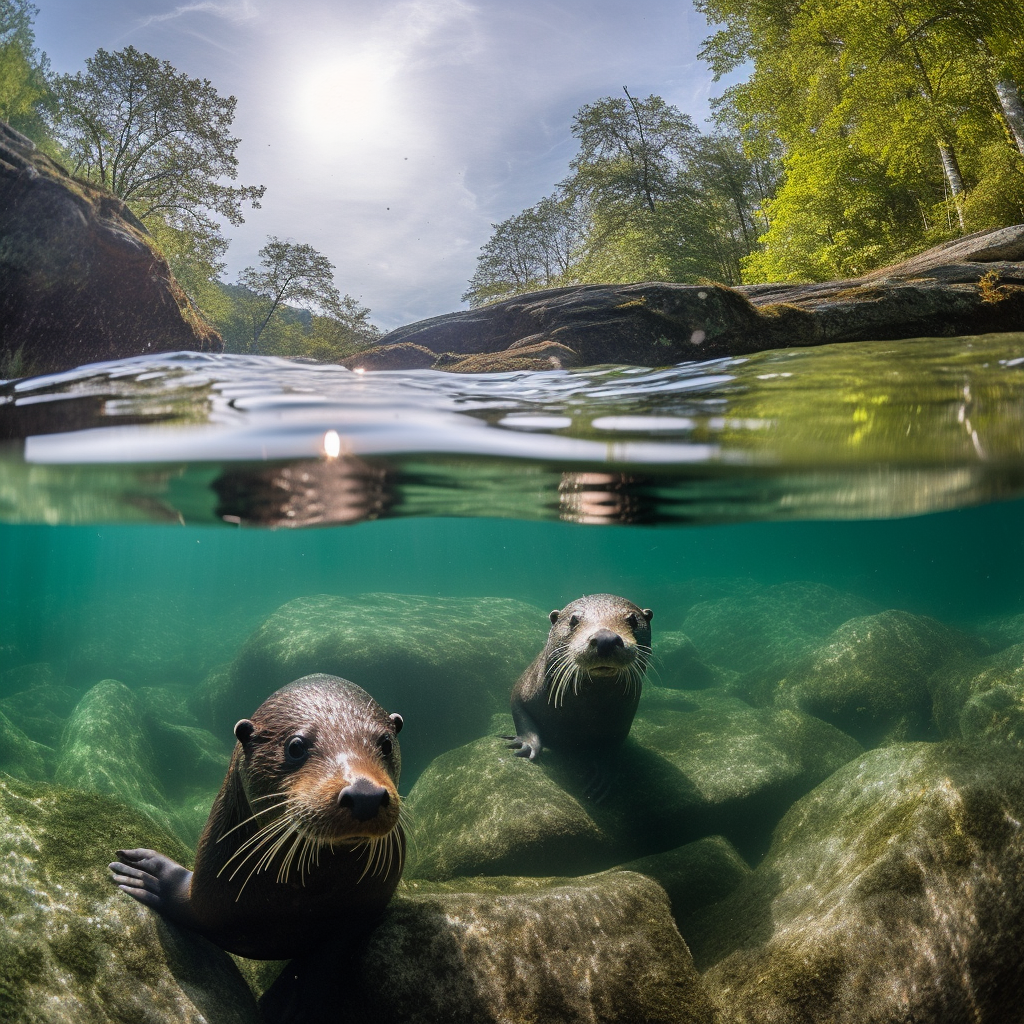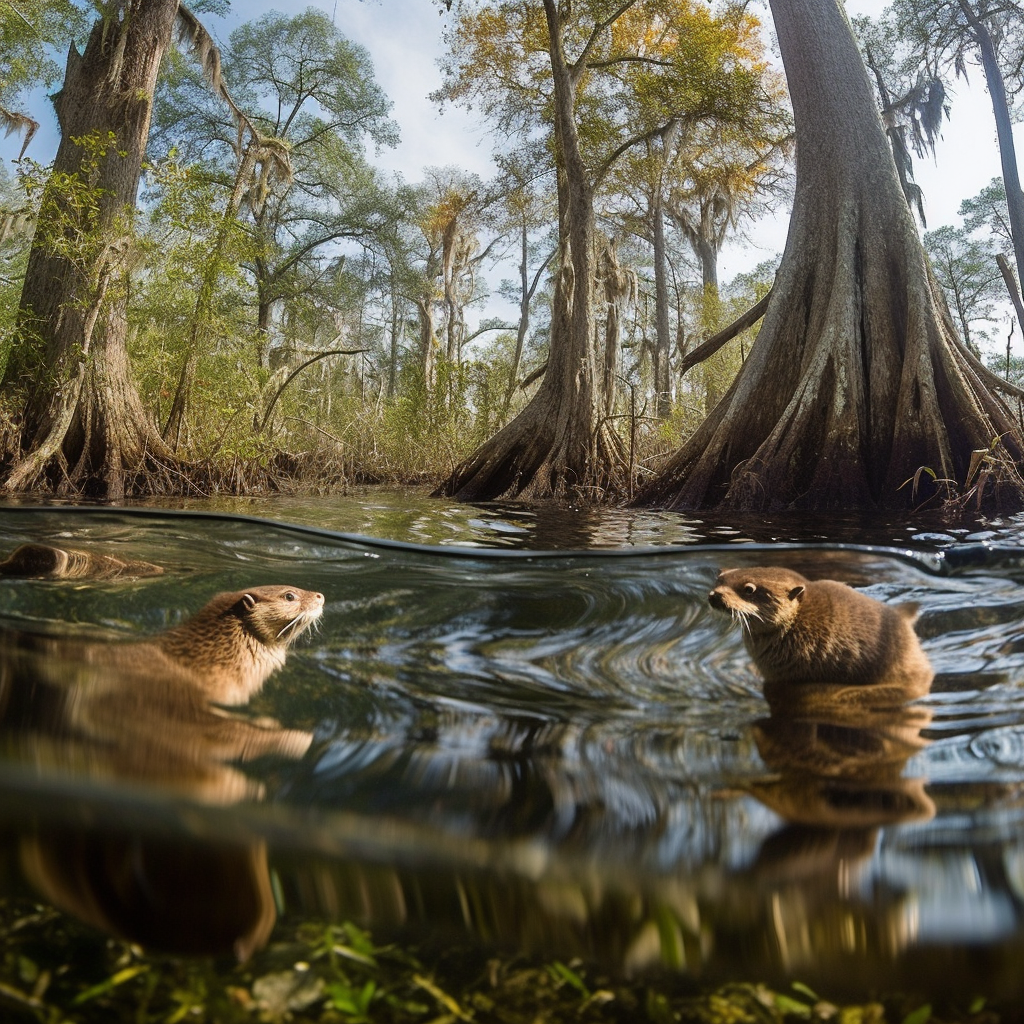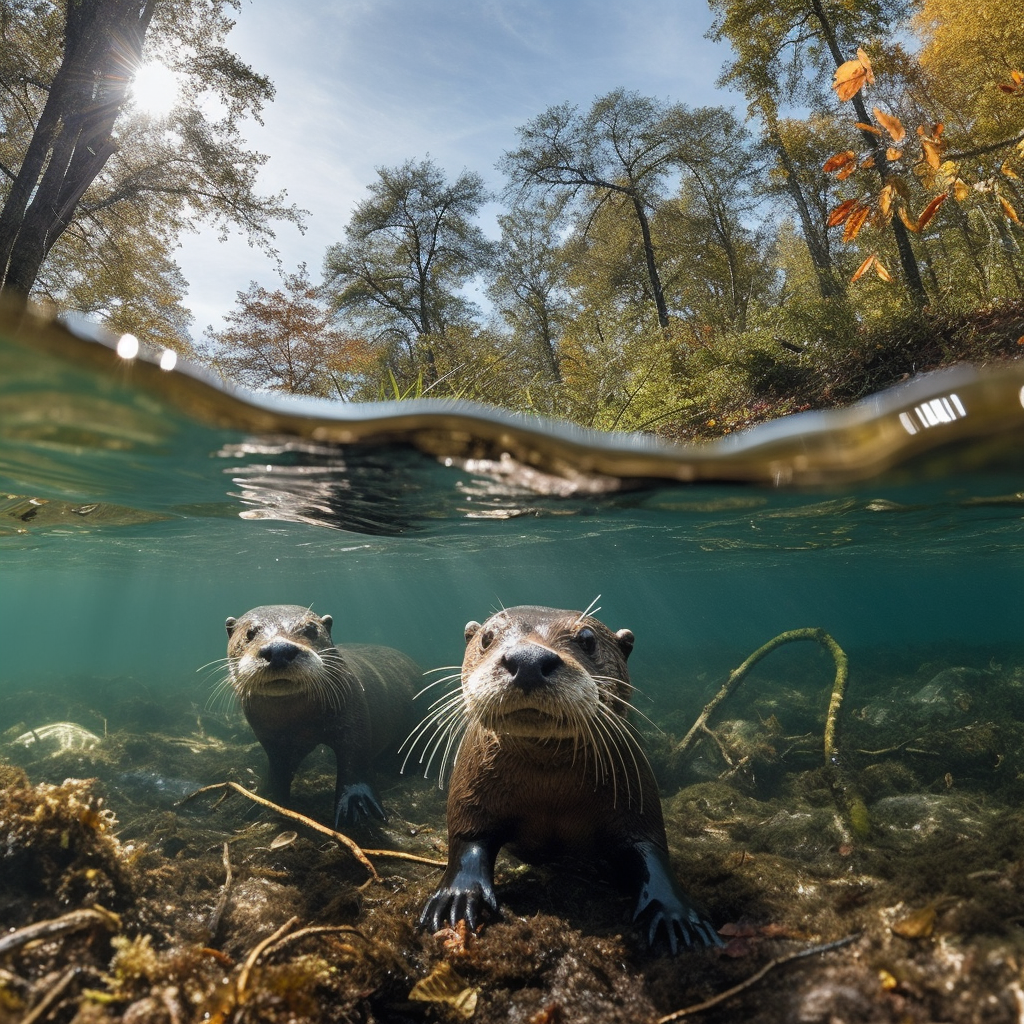River otters are fascinating creatures that can be found in various parts of the United States, including the beautiful state of South Carolina. These playful and intelligent mammals are well-adapted to their aquatic habitats, making them excellent swimmers and divers. In this article, we will explore the world of river otters in South Carolina, learning about their habitat, behavior, diet, and conservation efforts. So, let’s dive in and discover the wonders of these charismatic creatures that call South Carolina home.
Key Takeaways
- River otters are native to South Carolina and can be found in various habitats such as rivers, lakes, and swamps.
- They are highly adaptable and have a playful nature, often engaging in sliding and diving activities.
- River otters play a crucial role in maintaining the ecological balance of their habitats by controlling populations of prey species.
- Conservation efforts are important to protect river otters and their habitats, as they are vulnerable to habitat loss and pollution.
- Observing river otters in their natural habitat can be a rewarding and educational experience for nature enthusiasts.
The Habitat of River Otters in South Carolina

A. The Natural Environment of Otters in South Carolina
River otters in South Carolina are fortunate to inhabit a diverse range of natural environments that provide them with everything they need to thrive. From the majestic rivers and streams to the lush wetlands and coastal areas, these charismatic creatures have adapted to various habitats across the state.
Rivers and Streams: South Carolina is blessed with an extensive network of rivers and streams that serve as the primary habitat for river otters. These waterways, such as the Savannah, Santee, and Edisto rivers, offer an abundance of fish, their main food source. The otters’ streamlined bodies and webbed feet make them excellent swimmers, allowing them to navigate these watercourses with ease.
Wetlands: Otters are also found in the wetlands of South Carolina, including swamps, marshes, and bogs. These areas are teeming with aquatic vegetation, which provides cover and nesting sites for otters. Wetlands are crucial for the overall health of the ecosystem, as they act as natural filters, improving water quality and supporting a rich diversity of plant and animal life.
Coastal Areas: Along the coast of South Carolina, river otters can be spotted in estuaries, tidal creeks, and salt marshes. These brackish water habitats are home to an array of marine life, including crabs, clams, and small fish, which serve as additional food sources for otters. Despite the challenges posed by the changing tides, otters have adapted to this unique environment and have become skilled hunters in both saltwater and freshwater ecosystems.
B. The Impact of Ocean Code on Otter Habitats
While river otters in South Carolina have managed to adapt to various habitats, they face challenges due to human activities and the impact of climate change. One significant factor affecting their habitats is the Ocean Code, a term used to describe the combination of rising sea levels, increased storm intensity, and coastal erosion.
Rising Sea Levels: As sea levels rise, coastal habitats that otters rely on are at risk of being submerged. This can lead to a loss of suitable nesting sites and a decrease in available prey. Additionally, rising sea levels can result in saltwater intrusion into freshwater habitats, affecting the quality and availability of water for otters.
Increased Storm Intensity: South Carolina is prone to severe storms, such as hurricanes, which can cause significant damage to otter habitats. Strong winds and storm surges can destroy vegetation, disrupt food sources, and alter the landscape. These disturbances can have long-lasting effects on otter populations and their ability to find suitable shelter and food.
Coastal Erosion: Coastal erosion is another threat to otter habitats in South Carolina. As shorelines erode, the loss of vegetation and nesting areas can impact otter populations. Erosion can also lead to changes in water depth and flow patterns, affecting the availability of prey and altering the overall ecosystem dynamics.
Efforts are being made to protect and conserve otter habitats in South Carolina. Conservation organizations, government agencies, and local communities are working together to mitigate the impact of human activities and climate change on otters and their habitats. By raising awareness, implementing protective measures, and promoting sustainable practices, we can ensure the continued survival and well-being of these fascinating creatures in the beautiful natural environments of South Carolina.
The Distribution of River Otters Across the United States
River otters are fascinating creatures that can be found in various parts of the United States. Let’s explore the distribution of these playful mammals across the country.
A. Presence of River Otters in North Carolina
North Carolina is home to a thriving population of river otters. These charismatic creatures can be found in both freshwater and saltwater habitats throughout the state. With its diverse range of ecosystems, including rivers, lakes, swamps, and coastal areas, North Carolina provides an ideal environment for river otters to thrive.
In North Carolina, river otters are commonly spotted in the western part of the state, particularly in the Appalachian Mountains. The mountain streams and rivers offer an abundance of food and shelter for these otters. Additionally, the coastal areas of North Carolina, such as the Outer Banks, provide another suitable habitat for these aquatic mammals.
B. Existence of River Otters in Connecticut
Connecticut is another state where river otters can be found. Despite its smaller size, Connecticut offers a variety of habitats that support a healthy otter population. Rivers, lakes, and marshes are all prime locations for otters to establish their territories.
One of the reasons why river otters thrive in Connecticut is the state’s efforts in habitat conservation and restoration. Wetland preservation and water quality improvement projects have contributed to the resurgence of otters in the region. These initiatives have created a favorable environment for otters to flourish and have led to increased sightings of these playful creatures.
C. General States Where River Otters Reside
River otters can be found in many other states across the United States, apart from North Carolina and Connecticut. Some of the states where river otters reside include:
- California: River otters can be found along the coast and in freshwater habitats such as rivers and lakes.
- Florida: The Sunshine State is home to river otters in its wetlands, marshes, and rivers.
- Michigan: With its numerous lakes and rivers, Michigan provides ample opportunities for otters to thrive.
- Oregon: The rivers and streams of Oregon offer an ideal habitat for river otters.
- Washington: From the Puget Sound to the Columbia River, river otters can be found throughout the state.
These are just a few examples of states where river otters can be found. It’s important to note that river otters are adaptable creatures and can inhabit a wide range of aquatic ecosystems, including rivers, lakes, swamps, and coastal areas.
In conclusion, river otters can be found in various states across the United States, including North Carolina, Connecticut, California, Florida, Michigan, Oregon, and Washington. These states provide diverse habitats that support the thriving populations of these playful and charismatic mammals. Whether you’re exploring the rivers of North Carolina or the wetlands of Florida, keep an eye out for these fascinating creatures as they go about their daily activities in their natural habitats.
The Behavior and Characteristics of River Otters

A. Are River Otters Dangerous?
River otters are fascinating creatures that inhabit the rivers and wetlands of South Carolina. While they may appear cute and playful, it’s important to understand their behavior and whether they pose any danger to humans.
River otters are not typically dangerous to humans. They are generally shy and elusive, preferring to avoid human contact whenever possible. However, like any wild animal, they can become aggressive if they feel threatened or cornered. It’s important to respect their space and observe them from a safe distance.
River otters are excellent swimmers and are well-adapted to their aquatic lifestyle. They have streamlined bodies, webbed feet, and a thick layer of insulating fur that helps them stay warm in the water. They are known for their playful behavior, often sliding down riverbanks and engaging in social activities with other otters.
B. The Interaction Between River Otters and Humans
In South Carolina, there is a unique opportunity for humans to observe and appreciate the beauty of river otters in their natural habitat. However, it’s crucial to maintain a respectful distance and avoid disturbing their environment.
River otters play a vital role in the ecosystem by controlling the population of certain fish species and maintaining the health of rivers and wetlands. Their presence is an indicator of a healthy aquatic ecosystem, and efforts should be made to protect their habitats.
If you encounter a river otter while exploring South Carolina’s rivers or wetlands, consider yourself lucky. Take the opportunity to observe them from a distance, using binoculars or a camera with a zoom lens. Avoid approaching them or attempting to interact with them, as this can disrupt their natural behavior and cause unnecessary stress.
It’s also important to remember that river otters are protected by state and federal laws. It is illegal to harm, capture, or keep them as pets. If you come across an injured or orphaned otter, it’s best to contact local wildlife authorities or rehabilitation centers for assistance.
In conclusion, while river otters are not typically dangerous to humans, it’s important to respect their space and observe them from a safe distance. Appreciate their role in the ecosystem and the beauty they bring to South Carolina’s rivers and wetlands. By doing so, we can ensure the conservation and protection of these remarkable creatures for generations to come.
The Legal Aspects of Owning River Otters in South Carolina
A. Can You Legally Own an Otter in South Carolina?
When it comes to owning a river otter as a pet in South Carolina, the legality of the matter is an important consideration. While these playful and charismatic creatures may seem like an appealing choice for a companion, it’s crucial to understand the legal framework surrounding otter ownership in the state.
In South Carolina, river otters are protected under the state’s wildlife laws. They are classified as a native species and are subject to regulations that aim to ensure their conservation and well-being. As such, it is generally illegal to keep a river otter as a pet without the necessary permits and licenses.
The South Carolina Department of Natural Resources (SCDNR) is responsible for overseeing the management and protection of the state’s wildlife. They enforce regulations that govern the possession, transportation, and sale of native wildlife species, including river otters. These regulations are in place to safeguard the otters’ natural habitats and maintain the delicate balance of South Carolina’s ecosystems.
To legally own a river otter in South Carolina, individuals must obtain the appropriate permits from the SCDNR. These permits are typically reserved for educational or scientific purposes, wildlife rehabilitation centers, or individuals with specialized training and facilities to care for otters. It is important to note that obtaining these permits can be a complex and rigorous process, as the SCDNR ensures that otters are placed in suitable environments with experienced caretakers.
B. The Challenges and Considerations of Keeping River Otters as Pets
While the idea of having a river otter as a pet may be enticing, it is essential to understand the challenges and considerations that come with it. River otters are highly active, social, and intelligent animals that require specialized care and environments to thrive. Here are some key factors to consider before deciding to keep a river otter as a pet:
-
Legal Requirements: As mentioned earlier, owning a river otter in South Carolina requires obtaining the necessary permits and licenses. These permits come with specific regulations and responsibilities that must be adhered to, ensuring the otter’s welfare and the preservation of its natural behaviors.
-
Space and Enclosure: River otters are semi-aquatic mammals that require access to water for swimming and playing. They need a spacious enclosure that mimics their natural habitat, complete with a pool or pond for them to swim in. Additionally, the enclosure should provide ample space for them to explore, climb, and engage in their natural behaviors.
-
Specialized Diet: River otters have a diverse diet that primarily consists of fish, crustaceans, amphibians, and small mammals. Providing a balanced and nutritionally appropriate diet can be challenging and may require access to a variety of fresh and high-quality food sources.
-
Socialization and Enrichment: River otters are highly social animals that thrive in the company of their own kind. If kept as a pet, it is crucial to provide opportunities for socialization and mental stimulation. This can include interaction with other otters, engaging toys, and activities that encourage their natural instincts.
-
Time and Commitment: Owning a river otter requires a significant investment of time, effort, and resources. They need daily care, including feeding, cleaning, and enrichment activities. Additionally, regular veterinary check-ups and specialized medical care may be necessary to ensure their well-being.
It is important to note that river otters are wild animals, and even with the best intentions and care, they may not thrive in a domestic setting. Their natural behaviors and instincts may be difficult to replicate, and their needs can be challenging to meet adequately.
Before considering owning a river otter, it is crucial to thoroughly research and understand the legal requirements, as well as the ethical and practical considerations involved. Consulting with wildlife experts, veterinarians, and organizations specializing in otter care can provide valuable insights and guidance in making an informed decision.
The Conservation Status of River Otters in South Carolina

A. Current Population Trends of River Otters
River otters are fascinating creatures that inhabit the waterways of South Carolina. These sleek and playful mammals have a significant impact on the state’s aquatic ecosystems. However, their population has faced challenges over the years.
Historically, river otters in South Carolina experienced a decline in numbers due to habitat loss, pollution, and unregulated hunting. These factors led to a decrease in their population, raising concerns about their conservation status. Fortunately, efforts have been made to reverse this trend and protect these charismatic creatures.
B. Conservation Efforts and Their Impact on River Otter Populations
Conservation organizations, wildlife agencies, and concerned citizens have joined forces to protect and restore river otter populations in South Carolina. These efforts have had a positive impact on the species, leading to a gradual recovery of their numbers.
One of the key conservation strategies implemented is the restoration and preservation of river otter habitats. South Carolina’s rivers, marshes, and wetlands provide crucial environments for these otters to thrive. By safeguarding these habitats and promoting healthy ecosystems, conservationists ensure that river otters have suitable places to live and raise their young.
Additionally, the regulation of hunting and trapping has played a vital role in the recovery of river otter populations. Strict guidelines and permits are now required for hunting or trapping otters, preventing overexploitation and allowing the species to rebound.
Conservation efforts have also focused on raising awareness about the importance of river otters and their role in the ecosystem. Education programs, public outreach, and nature reserves have helped foster a sense of appreciation and understanding for these charismatic creatures. By engaging the public, conservationists have encouraged responsible behavior and stewardship towards river otters and their habitats.
The impact of these conservation efforts is evident in the increasing number of river otter sightings in South Carolina. People are now more likely to spot these playful animals along the state’s waterways, a testament to the success of ongoing conservation initiatives.
In conclusion, the conservation status of river otters in South Carolina has seen significant improvements in recent years. Through habitat preservation, regulated hunting, and public awareness campaigns, the population of these charismatic creatures has been steadily recovering. However, continued efforts are necessary to ensure the long-term survival and well-being of river otters in South Carolina’s diverse and vibrant ecosystems. Conclusion
In conclusion, river otters in South Carolina are fascinating creatures that play a vital role in maintaining the health of aquatic ecosystems. These playful and intelligent mammals have made a remarkable recovery in the state, thanks to conservation efforts and improved water quality. River otters are well-adapted to their aquatic habitat, with their streamlined bodies, webbed feet, and dense fur. They are skilled swimmers and divers, capable of catching fish, crayfish, and other small aquatic animals. River otters also have a complex social structure and communicate through a variety of vocalizations and body language. As top predators, they help control populations of prey species and contribute to the overall balance of the ecosystem. However, river otters still face threats such as habitat loss, pollution, and human disturbance. It is crucial that we continue to protect and conserve their habitats to ensure the long-term survival of these charismatic animals. By raising awareness, supporting conservation organizations, and practicing responsible outdoor recreation, we can all contribute to the preservation of river otters and the biodiversity of South Carolina’s rivers and wetlands.
Frequently Asked Questions
Do otters live in South Carolina?
Yes, otters do live in South Carolina. The River Otter, a common species in the state, can be found in various aquatic habitats including rivers, marshes, and coastal areas.
What is the ‘otter ocean code’?
The term ‘otter ocean code‘ is not typically associated with otter ecology or behavior. It could potentially be a misinterpretation or a specific term related to a particular study or project. For accurate information, it’s best to refer to specific sources or contact wildlife experts.
Are there river otters in Connecticut (CT)?
Yes, river otters are found in Connecticut. They are a native species and can be found in various aquatic habitats across the state, including rivers, lakes, and marshes.
Are there river otters in North Carolina?
Yes, river otters are also found in North Carolina. They are a native species to the state and inhabit its various aquatic ecosystems.
Are river otters dangerous?
River otters are generally not dangerous to humans unless provoked or threatened. However, like all wild animals, they can be unpredictable and should be observed from a distance.
Can you own an otter in South Carolina?
No, it is illegal to own a river otter as a pet in South Carolina. They are protected under state law and are considered a vital part of South Carolina’s aquatic ecosystems.
Can river otters be pets?
While otters may seem cute and playful, they are not suitable as pets. They are wild animals with specific needs that are difficult to meet in a domestic setting. In many states, including South Carolina, it’s illegal to own a river otter as a pet.
What states do river otters live in?
River otters are found in every U.S. state except Hawaii. They are most commonly found in areas with abundant aquatic habitats, such as rivers, lakes, marshes, and coastal areas.
Are there otters in South Carolina?
Yes, South Carolina is home to the River Otter. They are commonly found in the state’s rivers, marshes, and coastal areas.
What is being done for otter conservation in South Carolina?
South Carolina’s Department of Natural Resources works to protect and conserve otter populations in the state. This includes habitat preservation, monitoring of otter populations, and rescue and rehabilitation of injured or orphaned otters.




